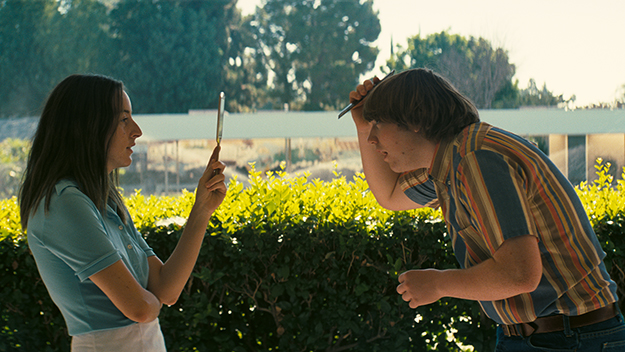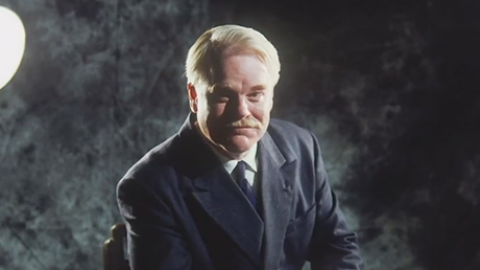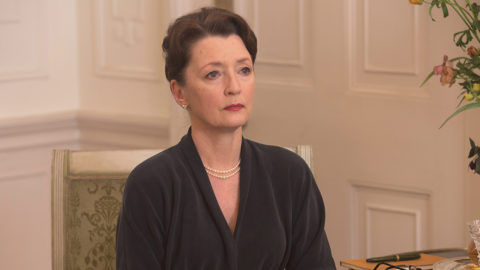I’ll Be Your Mirror
This article appeared in the November 24 edition of The Film Comment Letter, our free weekly newsletter featuring original film criticism and writing. Sign up for the Letter here.

Licorice Pizza (Paul Thomas Anderson, 2021)
Licorice Pizza, the long-withheld title of the long-awaited new film by Paul Thomas Anderson, is deliciously apropos. Savoring the vibes of his beloved San Fernando Valley, Anderson has concocted an eccentric, deeply appealing coming-of-age tale that is also, depending on where you bite, gratuitous and irritating. The movie is both too much and not enough, a sprawling picaresque stuffed with local pleasures that swerve through and around a slow-burning love story no less perverse—but far less reflexive and persuasive—than the brooding obsession of Phantom Thread.
Much has been made, deservedly, of the main ingredients. Cooper Hoffman plays Gary Valentine, a relentlessly congenial, pimple-faced 15-year-old whose guileless self-confidence and improbable entrepreneurialism suggest the SoCal nephew of Rushmore’s Max Fisher. An aspiring actor with a scattering of minor credits to his name, Valentine (rather too on the nose, that) develops an instant, indefatigable crush on Alana Kane (Alana Haim), a prickly gamine in her mid-twenties. Licorice Pizza is essentially a tale of puppy love at first sight complicated by the feline caprices of the hero’s beloved—and the conundrum that Gary is, technically speaking, thirsty for statutory rape. But boys will be boys in the Paul Thomas Anderson Cinematic Universe, and Hoffman proves a wonderfully affable screen presence, coasting through the narrative contrivances with unflappable likability. Gary undertakes a series of half-baked hustles (partly drawn from the life of Hollywood producer Gary Goetzman), including launching a waterbed operation and a pinball arcade, but his primary business is to win over his mysterious object of desire.
It is no less the central endeavor of Licorice Pizza, as well as its chief pleasure and deepest problem, to assimilate Alana Haim’s singular performance. Making her feature film debut alongside Hoffman, Haim arrives seasoned by her background performing in the namesake band she makes up with her older sisters Este and Danielle (who intermittently appear in the film alongside mom and dad), but nothing in a record as fine as Women in Music Pt. III can prepare you for this Woman in a PTA Movie. If Hoffman is serving neophyte Schwartzman vibes minus the hipster stylings, Haim grips the screen with a magnetism approaching the nouvelle vague advent of Anna Karina. She radiates a steely self-presence that crackles with tough-minded, sharp-tongued confidence even as it coils back on itself with the doubts, uncertainties, and aimless vagaries of a quarter-life crisis. Her performance is both savvy and unaffected, technically precise and radically instinctual. She abounds, for lack of a better phrase, in that ineffable form of fascination called “screen presence.”
It’s no wonder that every man she encounters latches on to her—nor that Anderson, whose sensibilities do not include a particular aptitude for feminism, doesn’t quite know what to do with her. Alana enters the picture working at a high-school yearbook photo booth: the scene, in Gary’s mind, of their inaugural meet-cute, but for her the first in a series of more ambivalent encounters and embroilments with various men. The plot, ramshackle as it might seem, develops along two clear lines. Gary glides smoothly through the narrative from start to finish, and if his affections for Alana are perpetually rebuffed, or her fleeting attachments to other suitors provide melancholy bumps along the way, he is effectively granted the frictionless trajectory of a man who knows what he wants and gets it. Which is to say, the prodigious charm of Gary’s artlessness is, in the end, an adorable example of male privilege.
Alana, by contrast, develops along a more erratic, zigzagging line, variously chumming along with Gary’s antics or drawn into the orbit of useless men as she ponders what to do with her life. Flirting with an acting career, Alana finds herself at dinner with the blowhard movie star Jack Holden (Sean Penn riffing on William Holden) that devolves into a ludicrous bit of stuntery featuring Tom Waits as the wingman to a display of machismo involving a motorcycle leap over a pit of flames. Left behind, quite literally, in the dust of this idiocy, Alana is whisked up by Gary for further misadventures, including an extended set piece featuring Bradley Cooper as Jon Peters, an amped-up poon hound who might have emerged from a coke den in Boogie Nights. Having ordered a waterbed from Gary but late to dinner with his lover, Barbara Streisand, Jon zooms off into the night leaving the kids behind but soon doubles back on foot to berate his mincing gay assistant (Ryan Heffington) for failing to put gas in his hotrod (much of the plot takes place against the backdrop of the 1973 oil crisis that left a car-dependent Valley in shambles.) What follows is another series of vehicular mishaps that finds Alana taking the wheel to extricate the crew from the clutches of their pervy client.
Discarded by Holden and molested by Peters, Alana next finds herself in thrall to a local politician (Benny Safdie) for whom she volunteers as a phone banker. This, too, ends in a dead end for Alana, and as the movie approaches its finale it is uncertain—both to her and the audience—where she’s going. She remains a question mark even as Anderson resolves his breathless blitz of a film with an effort to gather everyone up in a rousing hug. Crowd, are you pleased? If nothing else Licorice Pizza makes clear the delight Anderson takes in indulging his most eccentric impulses with an exuberance soured, for this viewer, by its strain of impunity. The Holden set piece is a tiresome sub-Tarantino routine overwhelmed by the flamboyance of Penn and Waits, who feel parachuted into the plot for the sheer razzle-dazzle of their star power.
Like Godard and Tarantino, Anderson has always struck me as a filmmaker who seems to have learned everything he knows about life at the movies. But if for Godard this entailed a theory and a politics, and for Tarantino it amounts to a passionate formalism, Anderson’s self-consciousness is torn between his ambitions to propose Grand Things About the Human Condition and flex his technical chops. I recognize that I’m in the small minority that does not find the results to generally reach what one PTA enthusiast tweeted as the “god-tier” achievement of Licorice Pizza. It is precisely a cinematic superego unencumbered by the world of mortals that would spike its “sweetest,” most “good natured” new opus with a gratuitously racist joke made, not once, but twice, at the expense of Asian women; that would show zero interest in the actual labor it would entail for a middle-class high-school kid to launch multiple businesses; and that, despite being gifted one of the most striking performances in recent memory, would be flummoxed by the notion that a supremely interesting woman could have any other destiny than to succumb to the allure of a teenage doofus.
For some time the working title of Licorice Pizza was Soggy Bottom, a notorious phrase dreaded by contestants on The Great British Bake Off for whom the production of a crust that isn’t audibly crisp is the ultimate fail. True to the show’s ethos of bonhomie and gentle critique, the judges go out of their way to praise the artful ambitions or yummy parts of the soggy bottomed bake. So allow this critic to follow suit and not let the ill-proportioned and distasteful bits of Licorice Pizza result in elimination. It’s pretty hard to fuck up a pizza, and for all the empty calories and lingering belly ache, I ate it up.
Nathan Lee is a longtime contributor to Film Comment and teaches film and media studies at Emory University.







